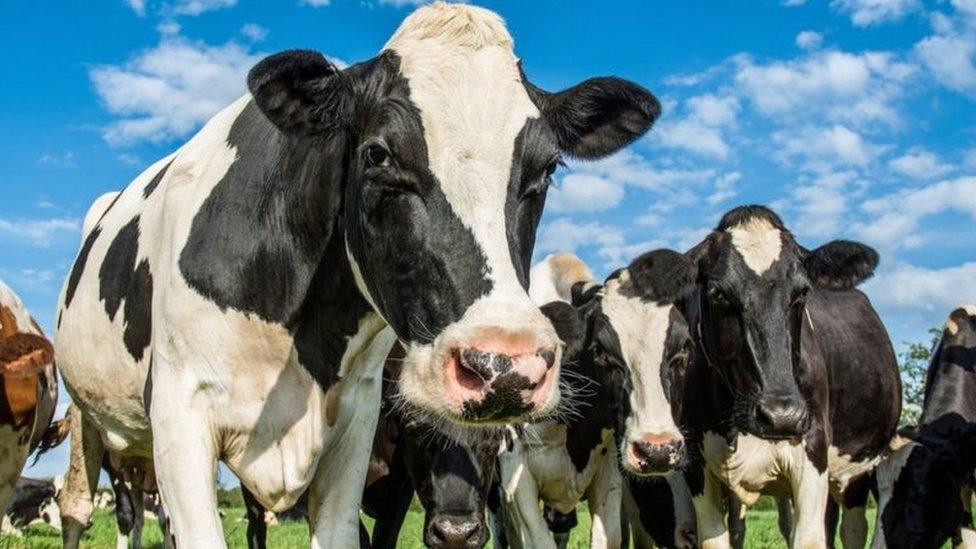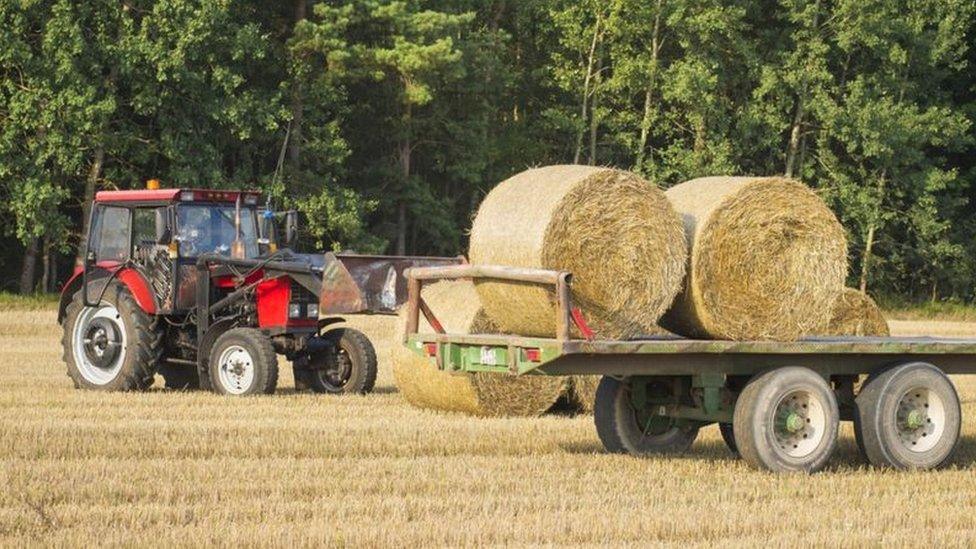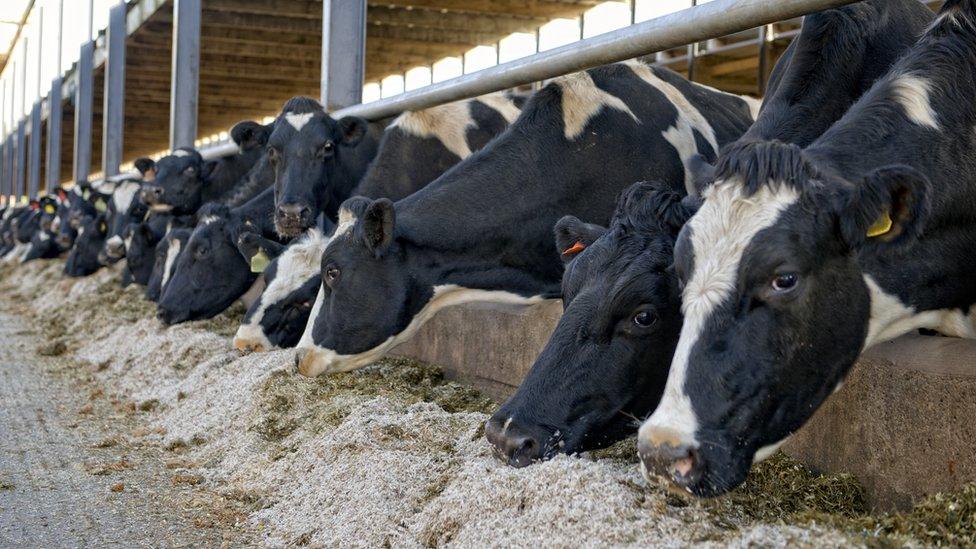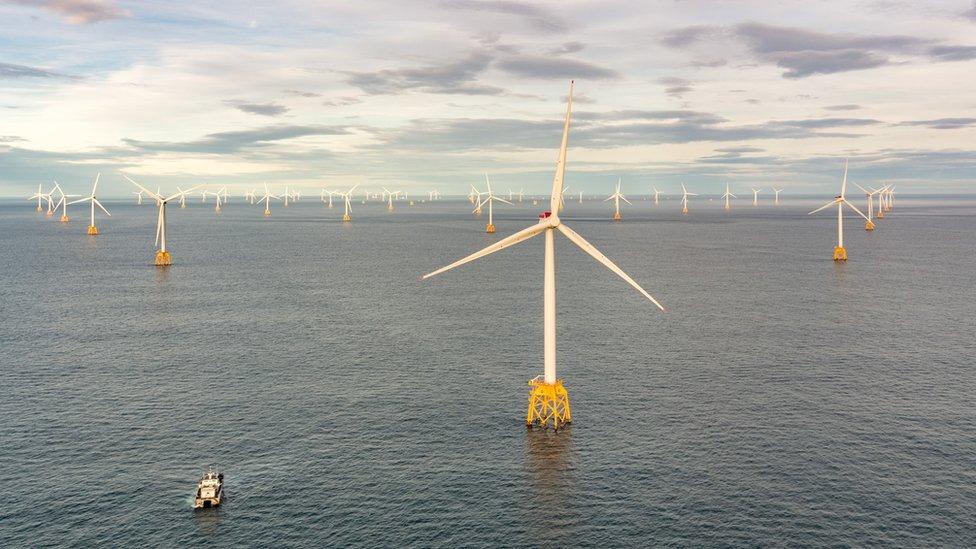Farming faces 'historic' shift to cut greenhouse gas emissions
- Published
- comments

The report calls for a drop in methane from livestock
Tackling greenhouse gas emissions in farming will require the biggest change since the shift from horses to tractors, a report says.
The Farming for 1.5C inquiry looked at practical ways in which the industry could help tackle climate change.
Its report says methane from livestock must drop while improvements are needed in soil and fertiliser management through precision farming.
But it says farmers need financial help if they are to deliver improvements.
Agriculture accounted for 15% of Scotland's total emissions in 2018, according to the most recent Scottish government assessment.
However, the amount of greenhouse gases removed from the atmosphere through land use and forestry is equal to 72% of agricultural emissions.
The transformation would be in five phases over 25 years but with some flexibility for farmers to choose their own speed of change.
The aim of the independent inquiry was to find a consensus on the best way for Scottish agriculture to reduce its emissions.
The panel was made up of farmers, scientists and environmentalists and was headed by the former NFU Scotland president Nigel Miller.

Industry experts say there must be a focus on precision farming
He told BBC Scotland: "Government is going to have to invest if it wants to see real change. It's not just investing in agriculture, it's investing in landscape and biodiversity.
For farmers, he said, it needs "a new mindset".
"We've got to think not just about producing food, we've also got to think more about managing carbon."
The report has come up with 15 recommendations including the creation of a transformation steering group.
Food additives
It says there needs to be technical and political clarity about what is expected of Scotland's agricultural land and businesses which goes beyond the five-year political cycle.
Highly potent methane from the digestion process in livestock needs to fall by 30%, it says, with nutrition and food additives helping to limit those emissions.
Integrating renewable energy into new electricity-powered farming technologies should be able to reduce fossil fuel use, it adds.
It also says there should be more "multifunctional land use" - such as agroforestry, where trees which remove carbon dioxide from the atmosphere are planted in fields where livestock are kept.
By 2030, it says there needs to be a change of land use on all farms where some crop land is planted with grass or trees.


Farmers have felt under siege over greenhouse gas emissions for several years now, with much focus on what we eat and the way they produce it.
Those I speak to insist they're not against change. In fact, most will tell you how different it is now compared to when their fathers ran the farms.
Most know that change is coming but nobody's been telling them what that entails - until now.
It boils down to precision farming and new techniques which put the environment on an equal footing with food production.
But food is what pays and some farmers will say it doesn't pay that much.
So the only way they're going to be able to do this is through farming subsidies.
Brexit means we're already having to design a new system for that anyway, and so it's now over to politicians to put their money where their mouth is.

The report comes ahead of publication of the Scottish government's updated Climate Change plan which should set out the emissions reductions individual sectors need to achieve.
That is due by the end of the year and will reflect the updated legal requirement to reduce emissions by 75% in 10 years.
Animal welfare
Agriculture is currently the third biggest contributor to greenhouse gases after transport and business.
Professor Geoff Simm, an expert of agriculture and food security at the University of Edinburgh, was also on the panel.
He explained: "I think it will have a big impact. What we have to achieve here is a balance because livestock, particularly ruminants, also have the ability to use resources that we can't use directly.
"By integrating, for instance, forestry with livestock production then inevitably there would be some reduction in the total output.
"But in doing so we would be achieving systems that have lower carbon emissions, better biodiversity and potentially higher animal welfare."
NFU Scotland president Andrew McCornick called for a long-term commitment from the Scottish government to help the agriculture sector "play its part" in tackling climate change.
He added: "The industry must be supported, guided by policy and equipped with science-led advice if we are to reduce emissions while continuing to produce high-quality food and drink."
- Published7 January 2020

- Published18 December 2020
